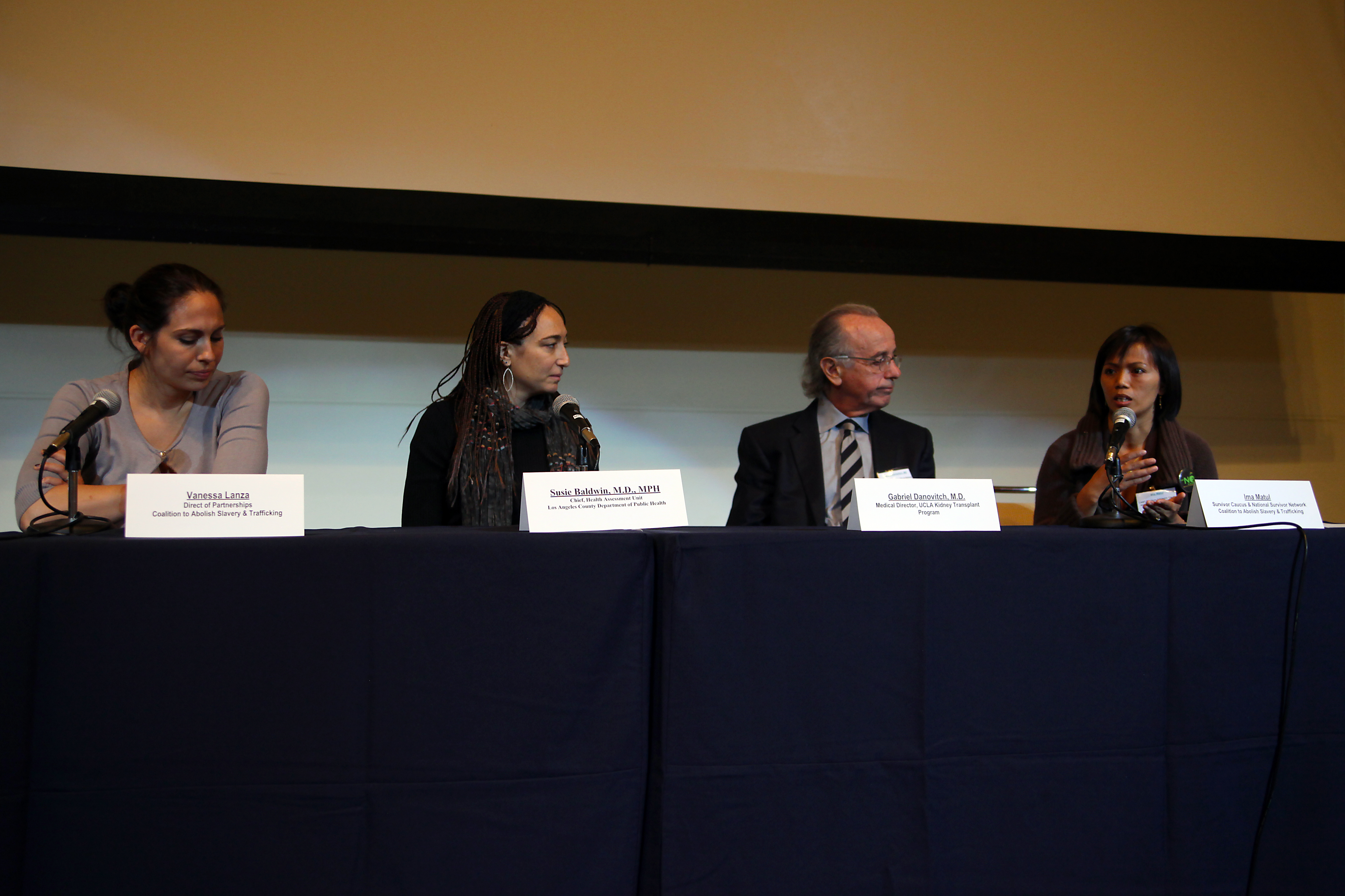Ima Matul left Indonesia in 1997 hoping to start a new life as a nanny in the United States.
As soon as she landed in Los Angeles, her employer took her passport and forced her to work 15 to 20 hours a day with no pay. She was just 17 years old.
Matul, a labor traffic survivor, now works for the Coalition to Abolish Slavery and Trafficking.
On Thursday, she shared her story at “Trends In Exploitation: Labor Trafficking and Organ Trafficking,” an event organized by the Iris Cantor-UCLA Women’s Health Center.
Designed to educate the public about the causes and effects of these human rights violations, the event also proposed solutions to organ and labor trafficking.
Both of these issues occur in Los Angeles, said Vanessa Lanza, director of partnerships at CAST.
During her talk, Lanza showed photographs of the El Monte sweatshop in Los Angeles County, where 72 Thai workers toiled for eight years to make clothing. On the outside, it looked like any other suburban home.
The interior shots, however, revealed scenes of squalor: 14 lice-infested mattresses crammed into a tiny room, windows nailed shut and wall-to-wall sewing machines.
“Los Angeles (county) is a local reflection of a global problem,” Lanza said during the presentation.
Victims of labor trafficking are sometimes controlled through physical violence, but psychological, emotional and sexual abuse can be just as damaging, said Susie Baldwin, chief of the health assessment unit at the Los Angeles County Department of Public Health’s Office of Health Assessment and Epidemiology.
UCLA helped fund her research on the topic.
These can lead to sleep disturbances, substance abuse and post-traumatic stress disorder among survivors.
Because of language barriers and fear, labor exploitation is often underreported, Baldwin said.
Gabriel Danovitch, medical director for the kidney and pancreas transplant program at the UCLA Ronald Reagan Medical Center, said organ trafficking is no less pervasive. Many of his transplant recipients spend six to nine years on a waiting listÂ.
While kidney patients can stay on dialysis machines, liver and heart transplant patients cannot wait that long. Many look to black market organ transplants as a last resort, he said.
These transplants ultimately harm the recipients because of high rates of infection, he said.
Middlemen often do not care about the donor’s health and will sell unhealthy organs, Danovitch said.
Apart from educating about trafficking issues, the event also encouraged the implementation of more labor and organ trafficking policies.
Lanza said CAST takes a three-pronged approach to the issue through advocacy, outreach to survivors, and client services such as shelter and preparation, so survivors can enter the workforce.
CAST is working on renewing the Trafficking Victims Protection Act, which must be reauthorized every three years, Lanza said. The act expired last month and has yet to be renewed.
To facilitate its goals, CAST is starting an internship at the beginning of next year, which will focus on advocacy and organization. The coalition is also interested in further partnering with UCLA, Lanza said.
Danovitch said the long-term solution for organ trafficking is research to determine why people are getting kidney disease.
In the meantime, he encourages students to sign up to be organ donors through channels that do not provide compensation for donation.
He said UCLA’s OneLegacy organ donation agency is an example to other donation centers around the world because of its professionalism.
Janet Pregler, director of the Iris Cantor-UCLA Women’s Health Center, said UCLA provides a venue for student groups that work with CAST.
One such group is the Anti-Trafficking and Human Rights Coalition at UCLA.
The group sends its members to teach workshops on health and other subjects at the CAST shelter in Los Angeles to keep survivors of labor trafficking from falling back into exploitative situations, said Annie Fehrenbacher, the club’s founder and president and a second-year doctoral student in the School of Public Health.
As for Matul, she has been a part of the CAST Survivor Caucus, an outlet for survivors who advocate for trafficking issues, since 2005.
She said her goal is to demonstrate that survivors can impact policy and make a difference in other people’s lives.
